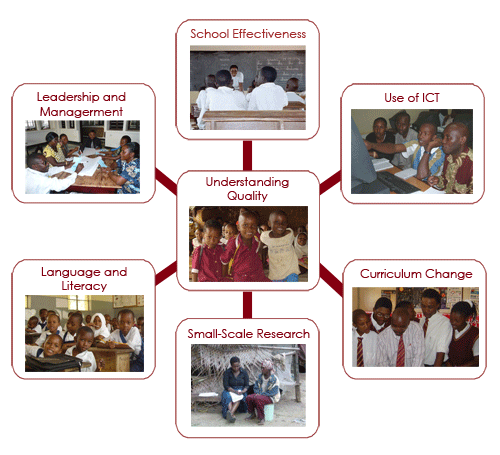Our Research
EdQual’s research creates new knowledge and strategies
for improving the quality of education for disadvantaged learners in low income countries.
This is a key development issue. Governments and donors aim to achieve universal primary education by 2015. But once children are in school, their learning needs will only be met if education quality also improves.
EdQual runs large and small scale research projects, mostly in sub-Saharan Africa, and also does theoretical work on understanding education quality.
Our approach and projects
Exploring ways to empower education professionals to make changes to their own practice and schools has been central in four of our five main projects.
These projects work closely with teachers, using action research or case studies to identify strategies to improve teaching and learning, particularly for disadvantaged pupils, that work in their own contexts. Examples include:
- Developing strategies and training materials to make better use of computers and software already available to schools to improve science and maths teaching in Rwanda;
- Developing bilingual strategies for teaching year groups before and after a transition in the language of instruction in Tanzania and Ghana; and
- Identifying how headteachers can use attendance and performance data to mobilize their staff and local community to improve participation and inclusion of disadvantaged pupils.
Our fifth project has analysed a large cross- national data set on primary school quality to identify the in and out of school factors that influence primary school pupils' achievement in reading and maths. Smaller-scale research has looked at school design and at inclusion, and we also sponsor ten PhD students.
More about us
The UK's Department for International Development (DFID) has funded EdQual Research Programme Consortium (RPC) between 2005 and 2010. Led by the University of Bristol, UK, the consortium involves partners in the UK, Ghana, Tanzania, Rwanda and South Africa, and has also collaborated with universities in Chile and Pakistan.
- Publicity material for EdQual RPC: Brochure (275.3 kB); Promotional presentation (273.2 kB); Poster (248.8 kB)
- Strategies and Guidelines: EdQual Ethical Guidelines (37.6 kB); Communications Strategy (current version) (610.3 kB); Capacity Strengthening Consultation Paper (151.5 kB)
- Annual Report to DFID:2008/2009(185.9 kB)
- RPC Newsletters: 2006 (748.9 kB); 2007 (325.8 kB); 2008 (510.4 kB); 2009 (280.3 kB)
For more information about EdQual RPC see the RPC Strategies and Reports section of our Publications page.
More information on our partner institutions and personnel can be found on our People page.







